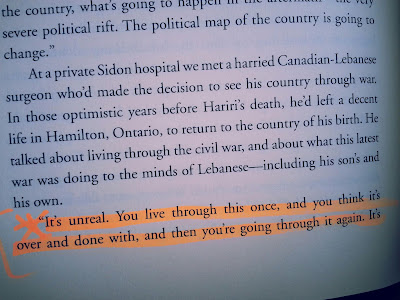She's very knowledgeable of the Arab language and culture. Her parents decided to move back to Amman, Jordan because they wanted their children to understand the culture and language. At six years old, she had to learn a new culture.
These two paragraphs stood out for me the most:
If there's one thing that journalists could learn from this book, it was the second paragraph. People are always the story. They're not quotes. It's a good reminder for aspiring and professional journalists that people are human too. Humans who should be treated as humans. They are people who has a history and culture.
In the first paragraph above Ayed mentioned understanding a country's history to understand the transpired events. In the second paragraph she talked of speaking the same language. And she's right. It's not just the language. It's understanding the cultures and backgrounds of different people that can transcend language. When you're familiar with a culture, you can understand that person's world views. Even better when you lived in that culture.
I eventually liked it as I continued reading. But the first two chapters didn't work for me. I didn't like how she introduced her relatives. It would've been better if she quoted her parents or grandparents so that readers can feel or sympathize with them. They seemed distant to me because Nahlah was telling the story of her family. It took me three chapters (almost two) to invest in the book. When she returned to the Middle East, that's when the book became exciting.
I loved the quotes from the people she interviewed because these people seemed alive.
These quotes were exactly what Ayed meant. In order for one to understand the Arab Spring, one must understand the people behind the revolution. There was a reason why they did it, and this book showed the reasons, from the Arab people themselves.
The book showed me a new perspective of the Arab Spring and its people. When I watched or read news about the Arab Spring, I didn't connect with the news because it was far away from my comfortable home here in Canada. But after reading the book, I understood them.
I saw a new perspective of the Columbine High School Massacre after I watched Michael Moore's documentary film "Bowling for Columbine" in 2008. I didn't know too much about the massacre because I was in the Philippines in 1999. I was 11, I was young, and I was ignorant of the world. The film made me aware of the world and the things I could learn. Moore didn't just show Eric Harris and Dylan Klebold's stories; he connected the shooting into a larger, social context. A context that's still an ongoing issue in U.S.A. today. Of course, Moore was biased, but as a documentary film, it worked. I learned more from it after watching it.
Just like reading the book. I learned more from it after reading it. So for anyone who's interested in finding more about the Arab Spring, this book is for you.






No comments:
Post a Comment